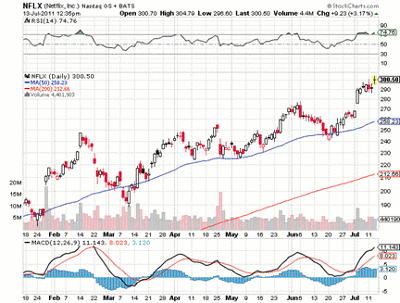The media company raised the ante big time by announcing a 60% rate hike for its entry-level service. Will the move make the company pop or fizzle? MoneyShow.com editor Mike McMeans reports.
I have to share a deep secret: I love fountain soda.
I can’t stand the overpressurized, stale acid that passes for pop in cans and bottles. And I can usually tell which restaurants put the time and effort into keeping their cola spouts clean and well mixed.
So when McDonalds (MCD) started its summer promotion, cutting the price of its large drinks to $1, I was thrilled. Even though the original price was only 79 or 89 cents higher, the price cut was enough to take any remaining hesitation out of getting my caffeine on.
NetFlix (NFLX), on the other hand, seems to be moving the other way—taking an (almost) throwaway expense and raising it to a level that requires some thought. It’s a big bet, and whether the company wins or loses, the implications for the home-entertainment industry will be massive.
Instead of paying $9.99 a month for unlimited DVDs at home and streaming video over the Internet, the company has split the baby into two $7.99 plans. Meaning that customers are facing either a 60% fee hike or a choice between watching physical DVDs or streaming video.
On its face, this looks like a preposterous move. Could it be that NetFlix, emboldened by the stock’s easy triple over the past year, has let the hubris take over?
That’s probably part of it, but there’s something much more ingenious at work here.
You see, NetFlix has not been unique in its field for a long time. Competitors—Hulu, prominently, but also Blockbuster (NCR), Redbox (CSTR), Apple (AAPL), etc.—have their own niche services, most with fees beneath the psychologically important $10 barrier.
And many customers, your author included, double or triple or quadruple up on these single-digit plans in ways we would probably hesitate to do if the costs were presented as one $50 bill. In short, NetFlix is betting that its customers keep its service, or even upgrade, choosing it as the family’s sole media source.
Again, it’s a big bet, and one that could pay off marvelously. But I’m not so sure...and here's why...
NEXT: 3 Ways This Gamble Could Backfire
|pagebreak|I see three potential problems:
- NetFlix has had trouble with price barriers before. In July 2004, the company raised its then-standard three-DVD plan from $19.95 to $21.99. (Streaming video was a distant dream back then.) The company reversed course within a few months—charging even less than before—but that didn’t stop the stock from plummeting more than 70% by the end of the year.
- There are cheaper options. Hulu’s main service is free, if ad-supported, and offers first-run TV programs, which NetFlix doesn’t. Redbox makes renting new releases as painless as my $1 Diet Coke. NetFlix is essentially relying on its extensive back catalog of physical DVDs to justify the cost, a strange move in our increasingly wireless society. (I mean, it certainly hasn’t kept Blockbuster or Movie Gallery in business.)
- Providers like NetFlix have been engaged in a cold war with the content makers—studios, recording companies, etc.—as the latter has been demanding more and more compensation. In the great spiral of life, the fee hike could be exactly what the studios need to justify their demands, which could spark further rate increases down the road, and so on.
Clearly, this sector is somewhat crowded, and someone has to try to pull away from the peloton or the race gets boring. But a 60% hike is a lot for customers to swallow. As Redbox proves with every DVD machine it installs, or McDonalds with every discount Coke it sells, the less you make customers question the cost the better.
NetFlix better hope the angry mobs threatening to cancel their subscriptions don’t follow through, or the latest Cinderella sequel could end with the glass slipper on another foot.
There doesn’t seem to be a major reaction in the stock price as of yesterday:
Long-term, however, we’ll have to see how this pricing change affects earnings, membership, and ultimately, the stock price.
By Mike McMeans, MoneyShow.com
At the time of publication, Mike McMeans did not own any of the stocks mentioned in this column.











